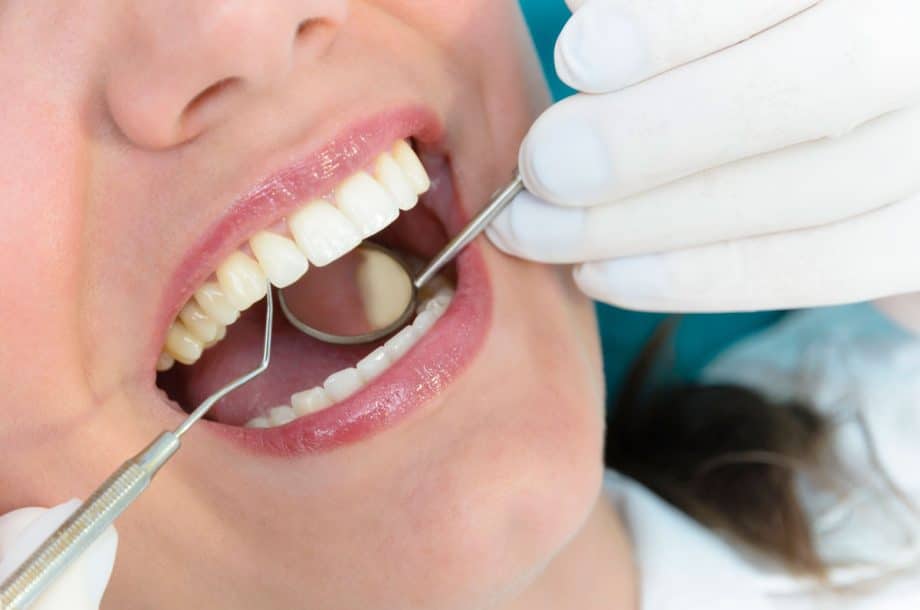Gum disease, or periodontal disease, is a common condition affecting nearly half of adults in the US. It can be mild, but if it progresses without treatment it can become advanced with serious health detriments. Gum disease is easily preventable with proper oral hygiene and regular care from a dentist. But in order to successfully prevent it, it helps to know what causes it in the first place.
Gum Disease is an Infection
Gum disease is a bacterial infection of the gum tissue. It occurs when plaque builds up on the teeth and doesn’t get brushed away. Plaque is food residue that remains on your teeth after you eat that is partially digested by your saliva. The bacteria in your mouth cling to the plaque and become concentrated in that area, usually along the gum line. This can cause the gum tissue to become infected, which is gum disease.
When plaque remains on the teeth for too long, it hardens and forms tartar or calculus, which is difficult to remove without dental tools. This increases the concentration of bacteria even more, further advancing the infection.
What is Gingivitis?
You may have heard the term gingivitis used before in reference to gum disease. Gingivitis is early, mild gum disease. When the infection first starts, your dentist can more easily treat it. Early treatment of gingivitis can prevent it from advancing to severe gum disease.
Prevention of Gum Disease
If you want to prevent gum disease from occurring, here’s what you can do:
- Brush Your Teeth. Dentists recommend that you brush your teeth twice a day. Typically once in the morning and once at night before you go to bed is sufficient. If you always brush your teeth but you still have a tendency to develop gum disease, consider getting an electric toothbrush for more efficient brushing.
- Floss Your Teeth. Because bacteria and plaque tend to build up between your teeth and along your gums, flossing is important. Flossing removes plaque that settles between your teeth and in the pockets between your teeth and gums. Dentists usually recommend flossing once per day.
- Use Mouthwash. Mouthwashes reduce the bacteria in your mouth, which can help to prevent gum disease. Rinse your mouth with mouthwash once a day.
- Visit the Dentist Regularly. The recommended schedule for dental visits is every 6 months. Dentists and dental hygienists remove plaque and tartar from your teeth with special tools that are designed to scrape it off without damaging the enamel. Regular removal of plaque can help to prevent gum disease.
- Reduce or Avoid Sugar. Foods and drinks that contain a lot of sugar increase the plaque and bacteria in your mouth because it clings to the teeth and feeds the bacteria. This increases your risk of developing gum disease. Avoid sugar when possible or try and reduce your consumption. Rinsing your mouth out with water or brushing your teeth after you eat or drink something sweet can help to reduce your risk.
Treatment of Gum Disease
If your gum disease is discovered early, it can be more easily treated. If it is more advanced, it may require more complex periodontal procedures to cure it. Treatment options include:
- Prescription Mouthwash. Your dentist may prescribe a mouthwash that will help to reduce the amount of bacteria in your mouth that is causing the gum disease.
- Scaling. Scaling is the removal of hardened tartar and calculus from the teeth, both above and below the gum line.
- Root Planing. Root planing involves smoothing out the surface of the teeth and roots to remove rough spots and pockets where bacteria can gather and infect the gums.
- Surgical Procedures. There are more in-depth surgical procedures that can be done to treat and prevent gum disease, such as pocket reduction surgery and gum tissue grafts.
Dentistry of Mendham Can Help Prevent and Treat Gum Disease
If you have struggled with recurring gum disease or you have symptoms such as bleeding gums, Dr. Rajan at Dentistry of Mendham can help you. Gum disease is common and very treatable. The earlier it is diagnosed the better, so don’t wait to make an appointment if you have symptoms.
Call 973-543-5700 to schedule a consultation or request an appointment. We look forward to helping you maintain healthy teeth and gums.

